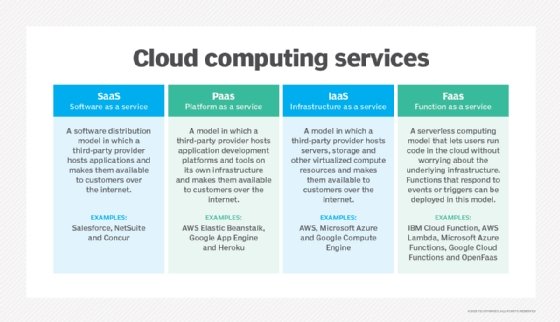Streamline IT Monitoring With Cloud Provider
Cloud services have arised as a feasible solution for businesses looking to enhance performance, reduce costs, and improve general IT efficiency. Exactly how exactly do these cloud solutions transform typical IT management techniques? Let's explore the transformative effect of leveraging cloud services on IT procedures and the essential considerations for effective execution.
Benefits of Cloud Services

Furthermore, cloud solutions enable organizations to enhance their operational efficiency by enhancing procedures and decreasing the time and sources required for managing IT framework. With cloud services, organizations can automate routine tasks, such as software program updates and information backups, maximizing IT groups to concentrate on more strategic campaigns that drive organization worth.

Improved Scalability and Flexibility
Cloud solutions offer companies with unequaled scalability and adaptability in handling their IT sources successfully. Scalability is an important feature of cloud services that allows firms to easily change their IT sources based on need. With cloud services, services can swiftly scale up or down their computing sources, storage space ability, and network data transfer to fulfill changing requirements without the requirement for considerable upfront financial investments in equipment. This versatility enables companies to adapt to changing workloads, seasonal demands, or unanticipated growth without experiencing downtime or efficiency problems.
In addition, cloud services supply the versatility to pick from a variety of service designs, such as Framework as a Solution (IaaS), System as a Solution (PaaS), or Software as a Solution (SaaS), based on the particular demands of the company. The boosted scalability and flexibility provided by cloud solutions empower businesses to enhance their IT operations and remain agile in today's vibrant market atmosphere.

Cost-Effectiveness and Financial Savings
With the ability to successfully assign resources based upon need, companies utilizing cloud services can harness significant cost-effectiveness and recognize considerable savings in their IT operations. Cloud solutions supply a pay-as-you-go design, permitting firms to only pay for the sources they make use of, removing the demand for huge ahead of time financial investments in equipment and software application. This scalability ensures that businesses can easily adapt to rising and fall demands without spending beyond your means on unneeded resources. Furthermore, cloud solutions minimize upkeep prices by changing the duty of hardware maintenance and software program updates to the provider. This lowers the need for devoted IT team to manage framework, further lowering operational expenses. The cloud supplies economic climates of scale, with carriers spreading expenses throughout numerous clients, resulting in lower individual prices for solutions like storage and computing power. In general, the cost-effectiveness and cost savings achieved via cloud solutions allow organizations to reapportion sources towards innovation and development efforts.
Improved Safety and Conformity
Enhancing the total security pose and guaranteeing regulative conformity are paramount considerations for businesses leveraging cloud solutions in their IT management strategies. important source Cloud solution suppliers provide advanced safety steps, such as information encryption, multi-factor authentication, and automated back-ups, which can strengthen a firm's security structure. These providers also stick to rigorous regulatory criteria, such as GDPR, HIPAA, and PCI DSS, helping services fulfill conformity requirements a lot more efficiently.
Executing cloud services can boost protection by providing systematized control over gain access to monitoring, surveillance, and information protection. This central approach simplifies protection management and makes sure constant application of security policies throughout the company. Cloud services often use real-time safety and security updates and patches, lowering the risk of susceptabilities and possible violations.
Best Practices for Cloud Execution
Carrying out cloud services efficiently needs an organized technique that encompasses thorough preparation and persistent execution. To make certain a smooth change to the cloud, organizations must start by carrying out an extensive analysis of their present IT framework and identifying which workloads appropriate for migration. It is important to establish clear goals and define key efficiency signs (KPIs) to measure the success of the cloud execution.
One of the very best methods for cloud application is to thoroughly pick a cloud provider that aligns with the company's needs in terms of safety, scalability, cost-effectiveness, and conformity. Furthermore, producing a detailed movement plan that describes the steps involved, timelines, over at this website and duties is essential for Home Page a successful application.
Routinely maximizing and monitoring cloud resources to guarantee reliable performance and expense administration is another essential facet of cloud execution best practices. Continuous evaluation of the cloud atmosphere and remaining notified concerning updates and brand-new attributes supplied by the cloud supplier can better enhance the organization's cloud method. By following these ideal practices, companies can streamline their IT administration and make best use of the benefits of cloud solutions.
Verdict
To conclude, leveraging cloud services for IT monitoring offers various benefits, including enhanced scalability, cost-effectiveness, enhanced safety, and conformity. By following finest methods for cloud execution, organizations can improve their IT procedures, automate routine tasks, and optimize source allowance. This structured approach allows IT teams to concentrate on critical initiatives and advancement, ultimately providing value to the organization. On the whole, cloud services improve functional performance and agility in managing IT infrastructure.
Furthermore, cloud services provide the versatility to pick from a variety of service models, such as Infrastructure as a Service (IaaS), System as a Service (PaaS), or Software Application as a Service (SaaS), based on the details requirements of the company. Additionally, cloud services lessen upkeep expenses by changing the obligation of equipment upkeep and software updates to the solution provider.Enhancing the general safety and security stance and ensuring regulatory conformity are extremely important factors to consider for services leveraging cloud solutions in their IT administration methods.Routinely optimizing and monitoring cloud sources to make certain reliable performance and price monitoring is another essential element of cloud execution finest methods. Continual analysis of the cloud setting and remaining educated about updates and new features offered by the cloud service provider can additionally enhance the company's cloud approach.